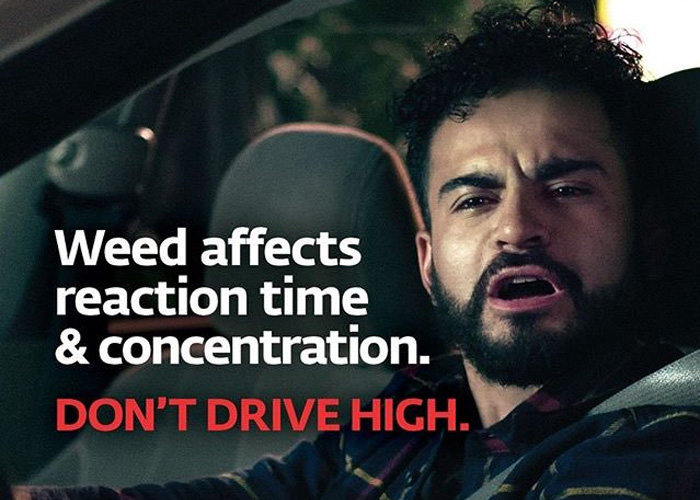Eight in 10 Manitobans say it’s unacceptable to drive after consuming marijuana, according to a recent Manitoba Public Insurance survey of 1,500 Manitobans.
Drugged driving is a concern of many Manitobans and as part of MPI’s ongoing commitment to road safety and educating drivers about the dangers of drug-impaired driving, the Corporation recently launched its newest public awareness campaign, “Don’t drive high!”
The campaign, which kicked off this month, includes outdoor, TV and online advertising, along with an interactive webpage featuring games which tests concentration and reaction skills.
“The legalization of non-medical marijuana has changed the landscape of road safety,” said Satvir Jatana, vice-president responsible for Communications, Manitoba Public Insurance. “Medical studies and research from leading organizations have reported marijuana use compromises reaction time and the ability to make safe decisions on the road.”
Education and public awareness are critical in making all Manitobans aware of the potential dangers of drugs and driving, said Jatana. Drivers who used cannabis are at 1.8 to 2.8 times more at risk of being involved in a fatal crash, states the Traffic Injury Research Foundation.
Impaired driving continues to be a major issue on Manitoba roadways. In total, 70 people were killed in auto-related crashes in 2018, with preliminary analysis showing 45 per cent of those deaths linked to impaired (alcohol or drugs) driving.
Other highlights of the recent MPI survey:
- Eight in 10 Manitobans say: It’s unacceptable to drive after consuming marijuana (78%); It’s likely for a driver to cause a collision when driving under the influence of marijuana (76%)
- Five per cent of Manitoba drivers admit to driving after consuming marijuana (driving within two hour of consuming marijuana within in the past two months) which equates to one in 20 drivers
Manitoba Drug and Alcohol Roadside Survey
In 2016, MPI commissioned the Manitoba Drug and Alcohol Roadside Survey which reported one in 10 Manitoba drivers who participated in the voluntary roadside poll tested positive for drugs. Of the 1,230 drivers who participated in the survey, 124 tested positive for drugs with 53 per cent testing positive for cannabis, 31 per cent for cocaine and 12 per cent for opioids. Twenty two per cent of these drivers tested positive for more than one drug.
“Impairment by drugs is not only a risk related to cannabis use,” said Jatana. “Use of illicit drugs, and even legally prescribed medication, can impair judgment and motor skills. Driving impaired, either by alcohol or drugs, is illegal in Manitoba.”
Impaired driving has serious consequences
Manitoba has among the toughest impaired driving laws in Canada. Current penalties for driving with a blood alcohol concentration equal to or over .08 or a blood drug concentration over five nanograms of THC can include a three-month administrative licence suspension, vehicle impoundment, an impaired driver assessment, moving five levels down the Driver Safety Rating scale, and Criminal Code charges.
An impaired driving-related conviction under the Criminal Code results in additional penalties that may include significant court-imposed fines, potential imprisonment, possible vehicle forfeiture, a court-imposed driving prohibition, further movement on the Driver Safety Rating scale, mandatory driver’s licence suspension and participation in the Ignition Interlock Program.


